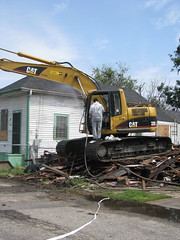Our returning champion of humanitarian work, Mr. Tarak, joins us to discuss what is happening on the ground in Haiti as the country struggles to deal with extreme weather and a humanitarian disaster.
Texas gets Smaller
Interesting piece from McClatchy newspapers included on the Guardian online today, all about the dramatic change to the Texas coastline that will follow this latest hurricane.
 Texas is of course famous for being huge, but also for having a highly developed coastline and generally a very polluted environment. And one of the changes that is mentioned in the article is the rising sea level, they quote an article in the journal Science:
Texas is of course famous for being huge, but also for having a highly developed coastline and generally a very polluted environment. And one of the changes that is mentioned in the article is the rising sea level, they quote an article in the journal Science:
global sea level rise of 31.5 inches by the year 2100 should be the assumption. The highest conceivable rise, they estimate, is 6.5 feet.
6.5 feet..? 2 meters in less than 100 years, at the most.
More disturbing changes for Texas, many of the important barrier islands were washed away during Ike, and other natural barriers have also taken a huge hit. This means the next storms will do even greater damage to places further inland, possibly places that are not prepared to deal with flood waters and dangerous winds.
If you read the article for yourself it gets into oxygen levels in the gulf of mexico, which are also a major point of concern.? Yet somehow since hurricane ike passed you don’t see the mainstream examining these issues and investigating how the coast is going to be OR not be re-enforced and restored in an environmentally sound way.? Much like in Louisiana, once again we are left wondering if there will even be a coastline in 20 years, and why is the federal government not preparing for this reality.
Later this week I’ll be back on this topic, only this time with a focus on the very grim recovery process in Haiti.
bmtv90 Zimbabwe: Progress or Collaboration?
After many weeks without a vlog entry, this one was recorded today as I floated through the Oud West. Its short and addresses the recent changes in Zimbabwe where opposition leader Morgan Tsvangirai has now joined in the government of Robert Mugabe as prime minister.? Which begs the question, is this good news? Oh and yes the video at the end comes from the fine people at the guardian.co.uk.
bm279 Demolishing New Orleans, Post Gustav
It is no secret that the post Katrina rebuilding effort has been mismanaged, but now the city of New Orleans is taking that to a new level, post Gustav. My guest on this podcast is Karen Gadbois, who writes the blog squanderedheritage.com, focusing on housing and history in New Orleans. Together we look at the city’s accelerated policy of demolishing houses with minimal to no notice.
 Among the topics we discuss:
Among the topics we discuss:
- The policy
- Gustav as the excuse
- Post Ike damage
- The living museum that is NOLA
- Grassroots action and organization
- The role of bloggers
- The other arguement, rationalizing the speedy demolitions
- Demographic change and development plans
- Wetlands resoration and the need for it
- Entergy
- Jail
Music:
Mof Def – Dollar Day
Dirty Dozen Brass Band – Whats going on?
The Super Rich vs The Super Poor in the US
Normally I prefer to NOT talk about the US elections. I’m not very impressed or excited by the actions and promises of either candidate of the 2 parties that share control of the country.? Sure Obama says things I like better than the things that McCain says. But that doesn’t automatically mean I’m satisfied or impressed.
 One of the big issues for me is poverty.? Gone is the one candidate who at least spoke the words “the poor” in his speeches and proposed policies (John Edwards), the remaining 2 candidates call everyone working families or hard working Americans, little buzz phrases that are just vague enough to make everyone think this candidate is speaking for them.?? Meanwhile poverty in the US is on the increase, and also alarming, the wealthy class is more wealthy than ever in history and that gap between the two is wider then ever.? A fact that opens the door to many social, financial, and political problems.. yet there is little action or demand to put a stop to it.? (yes yes, both candidates mention their concern for CEO’s making so much money, I’m aware of that)
One of the big issues for me is poverty.? Gone is the one candidate who at least spoke the words “the poor” in his speeches and proposed policies (John Edwards), the remaining 2 candidates call everyone working families or hard working Americans, little buzz phrases that are just vague enough to make everyone think this candidate is speaking for them.?? Meanwhile poverty in the US is on the increase, and also alarming, the wealthy class is more wealthy than ever in history and that gap between the two is wider then ever.? A fact that opens the door to many social, financial, and political problems.. yet there is little action or demand to put a stop to it.? (yes yes, both candidates mention their concern for CEO’s making so much money, I’m aware of that)
All this to bring me to my big recommendation of the day; the latest edition of Radio Open Source, where Chris interviews Chuck Collins.? While I’ve never heard of Chuck Collins, who is a specialist in the areas of US incomes, property, and economics, I found myself rewinding various segments to listen again.
You’ve heard it said before, though rarely do leaders or corporate media investigate it, the inequality boom in the United States is dangerous.? I highly recommend listening to this interview and soaking it in, it is the kind of critical thinking that we should be pummeling these candidates with.. obligating them to not just make the occasional lament, but to lay out a serious point by point plan for turning the tide and making it politically and hopefully cuturally a priority to preserve opportunity and keep the playing field of life and work from becoming an out of control thunderdome.
Calculating Sept. 11th
 As much as I hate what a giant clich? this date has become, there are still a few memories and pieces of culture I don’t mind revisiting.? Moreover I hope this day would be a reminder to put things in perspective, in my case to never forget how dangerous jingoism and blind patriotism have been for this planet since 9/11 and long-long before it.
As much as I hate what a giant clich? this date has become, there are still a few memories and pieces of culture I don’t mind revisiting.? Moreover I hope this day would be a reminder to put things in perspective, in my case to never forget how dangerous jingoism and blind patriotism have been for this planet since 9/11 and long-long before it.
If I could recommend 1 piece of audio that I replayed today, I recommend Radio Open Source’s episode on calculating the value of a human life. It features a very unique interview that I always remember, with the person put in charge of calculating the financial compensation for the families of those who died on this day in the World Trade Center towers. Go listen.